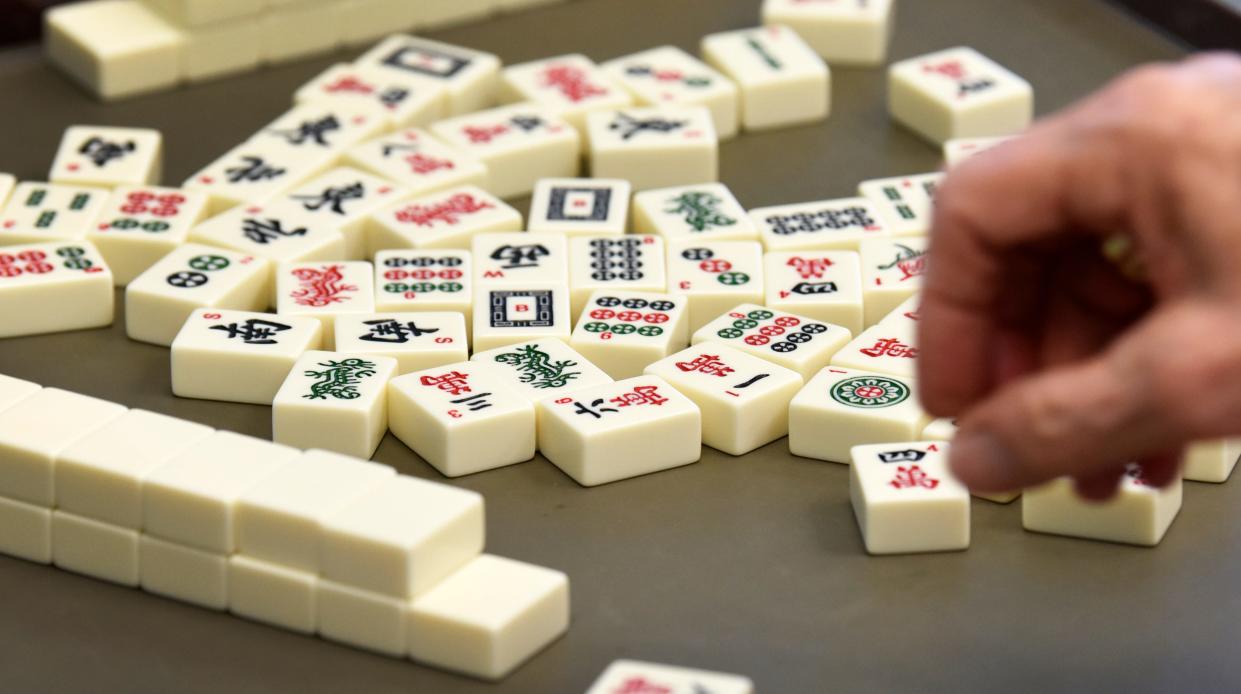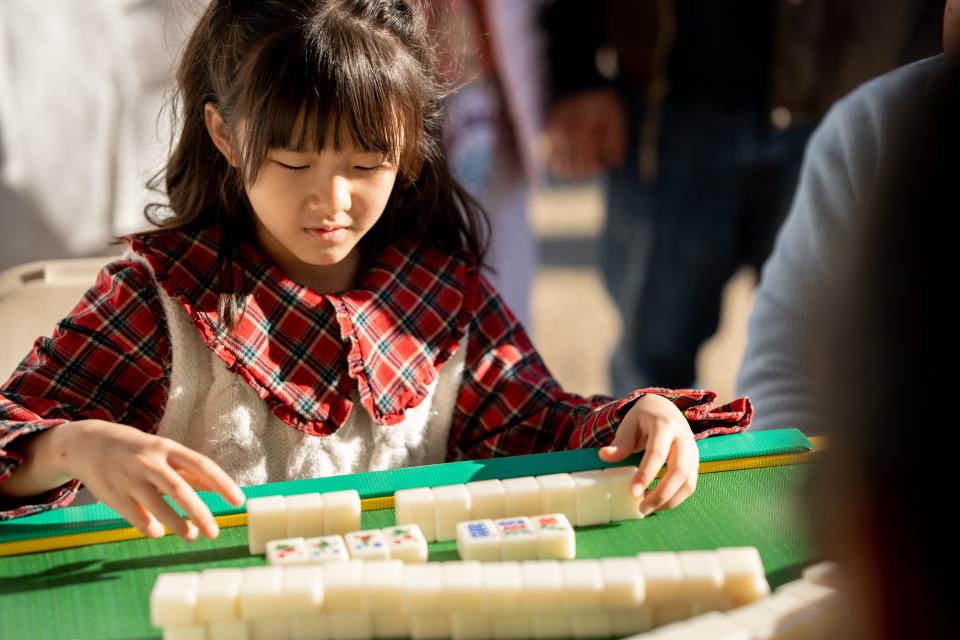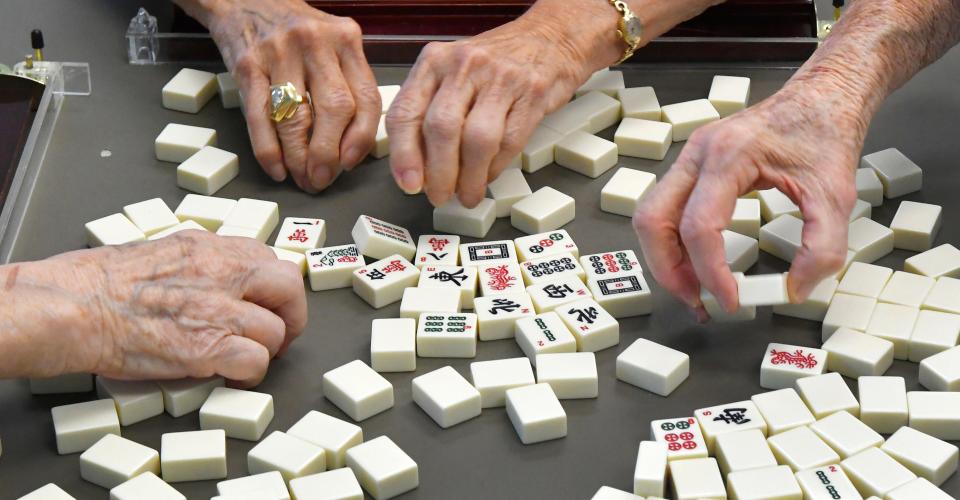'It will not be played in Canton if I can help it.' Police chief tried to outlaw mahjong

Mahjong — also known as "pung chow" — was more than an afternoon or evening of tabletop entertainment a century ago.
In 1923, playing mahjong — at least the betting version — was a reviled game of chance, and could get you arrested if you competed in it for money.
"Canton Is In Path of 'Mah Jongg' Craze That Is Sweeping The Country," a front page headline told readers of The Sunday Repository on March 11, 1923. "Chief (S.A.) Lengel Says It Will Be Classed As Gambling."
The Canton Police Department was taking steps to combat the arrival of the tile-based game that began in earnest in 19th century China and spread to other areas of the world beginning early in the 20th century.
"Within the past week or so, the 'Mah Jongg' craze that has been sweeping through the east, has struck Ohio and already is said to have supplanted bridge in many card clubs in Cleveland, Columbus, Cincinnati and other Ohio cities," the Repository reported.
"Cantonians already are trying to find out how to play the new game, which is said to have gained hundreds of thousands of new devotees all over the country in the past few months. Canton merchants say that numerous inquiries for 'Mah Jongg' sets have been made at stores here. In Columbus, classes in instruction in 'Mah Jongg' are being held daily in one of the largest hotels."

Canton had China connections
You don't have to be an historian to believe that of any community in the country, a city named Canton — given the moniker by surveyor Bezaleel Wells as a tribute to sea captain John O'Donnell, who had named his plantation Canton after Canton, China — would have plenty of reason to endorse a game developed in that far-away Asian country.
But mahjong was not welcomed in the city, at least not by law enforcement. In fact, the pastime was not to be tolerated, according to Canton Chief of Police S.A. Lengel.
"It will not be played in Canton if I can help it," Lengel said.
According to the Repository's article, the chief "leaned back in his swivel chair and smiled" as he spoke, "but his words were very straight and they sounded as if the chief meant them."
"It is taking a chance with money just the same as any other gambling and if it is done behind locked doors and darkened windows without my knowledge, I won't allow it any more than I'd allow any other transgression of the law."
So, if Canton residents wanted to play mahjong for money, which was "quite the rage" at the time, they ran the risk of getting arrested.
To be sure, the police were not focused on disrupting mahjong games staged for the recreation of participants who put no cash up for grabs.
But, mahjong carried the reputation of being a gambling game — sometimes for high stakes.
"The Chinese say players have made and lost fortunes in a single evening," the Repository's story explained. "For to sit in a game of Mah Jongg one must have a little time and a little money and be willing to take a chance with either. That sounds like the qualification for a number of other games, American and otherwise, which keep husbands out late and send them home empty-pocketed.
"According to the interpretation of the law, it is gambling, pure and simple and not to be tolerated at all."

History of the game
The article went on to say that there was "a certain amount of glamour and romance" in the history of mahjong.
Still, the Repository writer reported, a source with a Chinese background told the newspaper that "the moral standing of the game has never been ranked as high" as Chinese chess games.
"Mah Jong is 50% a game of chance," explained the Repository, "while the chesses are 100% games of wit."
And, again, there is, it seemed in 1923, the need for money to be exchanged, beginning at the time the mahjong tiles are purchased.
"There is considerable outlay necessary for a set, which comes in a handsome cabinet and, if imported, has 136 pieces, made of ivory and bamboo, or bone and wood, back to back, with the denominations on the ivory or bone faces," noted the Repository. "The American sets are like small glazed tiles, but rather thin and liable to fall and expose the hand which is not held in the player's hand but placed on the table before him, like dominoes.
"Second, you must have money because, when the game is over, which may be in five minutes or half and hour, according to your luck, everyone pays the winner."
Certainly many of the mahjong games are not high-stakes contests, or even played for money at all. These recreational games were, 100 years ago and even today, contests engaged in for the enjoyment of the competition and the fulfillment of social contact.
Still, there remains a fine line between such games as mahjong and what we might consider serious gambling, at least for some who judge them.
In November 2015, police in Altamonte Springs, Florida, raided a friendly game of mahjong played by four elderly ladies in a condominium clubhouse, according to an article in the Orlando Sentinel. It turned out, according to Sentinel, "someone was suspicious" of these "gambling grandmas."
One of the participants called it "ridiculous" that someone had called police attention to the condo clubhouse game, during which four women "spent hours around a table overlooking the pool, wagering on Mah-Jongg," explained the newspaper.
"The probe was prompted by a complaint to state authorities about gambling at the complex, including penny-ante poker, $5 bingo nights and Mah-Jongg games," reported the Sentinel. "Police ultimately decided the small-stake games were harmless and apologized."
"My neurologist ... said it's very good for the brain," one of the participants noted.
Mahjong similar to card game
Employing the strategy needed to win at mahjong challenged players to think, much in the manner of card games, the Repository explained in 1923.
"Mah Jongg shows a strange kinship with rummy which, under the cognomen of 'rum,' is played with a great deal of enjoyment before a fire on a wintry evening when conversation has lagged to the degree of boredom," the newspaper noted. "But, with Chief Lengel on hand to carry out his promise, there seems to be very little likelihood that Mah Jongg will succeed 'rum.' It will probably be for the more daring bridge and poker players to take up the new game behind locked doors and darkened windows."
Indeed, on the same day that the police chief threatened to shut down mahjong games, the newspaper printed a poem about mahjong as one of the items in the "Random Rambling" column, which collected "Jingles and Jottings from News of the Day."
The final two stanzas summed up the police chief's law enforcement stance.
"But, in spite of the chief,
"If Cantonians say,
"That they get some relief
"From ennui when they play
"This new Chinese game,
"They will play it, of course,
"And to stop it, he'll need
"A much larger force."
Reach Gary at gary.brown.rep@gmail.com.
On Twitter: @gbrownREP
This article originally appeared on The Repository: Canton police tried to ban mahjong in the 1920s

